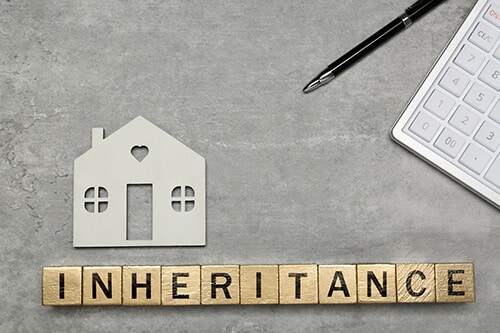Inheritance Tax: Can it Cost You to Inherit in New Jersey?
Explore the Critical Considerations and Top Things to be Aware of When Seeking to Minimize or Avoid Paying Inheritance Taxes
 Can it cost you to inherit in New Jersey? In some situations, yes. Before January 1, 2018, New Jersey imposed both an estate tax and an inheritance tax, but a legislative change phased out the estate tax for estate of individuals who passed on or after January 1, 2018. While this eliminated some of the tax burden for beneficiaries, the inheritance tax is still in effect. Inheritance tax is sometimes known as “transfer inheritance tax” because it applies to the right to receive the property when it is transferred from the decedent to the beneficiary.
Can it cost you to inherit in New Jersey? In some situations, yes. Before January 1, 2018, New Jersey imposed both an estate tax and an inheritance tax, but a legislative change phased out the estate tax for estate of individuals who passed on or after January 1, 2018. While this eliminated some of the tax burden for beneficiaries, the inheritance tax is still in effect. Inheritance tax is sometimes known as “transfer inheritance tax” because it applies to the right to receive the property when it is transferred from the decedent to the beneficiary.
Who is Subject to the New Jersey Inheritance Tax?
Whether the inheritance tax applies depends on the relationship between the decedent and the beneficiary. Before diving further into the application of inheritance tax, it is useful to understand how the law categorizes different potential beneficiaries. New Jersey law groups beneficiaries into different classes. For purposes analyzing inheritance tax, Classes A, C, and D are relevant. Class B was eliminated in 1963 and Class E includes charitable organizations, religious institutions, medical and educational institutions, and the State of New Jersey (if there are no other eligible beneficiaries).
Different Categories of Beneficiaries
Class A includes the decedent’s parents, grandparents, children, grandchildren, and all other descendants, as well as their spouse or civil union partner. Class C includes the decedent’s brothers, sisters, half siblings, and widow or widower of the decedent’s child. Finally, Class D applies to all other eligible beneficiaries that are not in Class A or C, like cousins, nephews, nieces, aunts, or uncles.
Class A beneficiaries are completely exempt from the inheritance tax. So, if you inherit property from your parents or any other individual in Class A, then you will not be subject to the inheritance tax. However, if you are inheriting from your sibling, then you will be classified as a Class C beneficiary with the first $25,000 of your inheritance being excluded from inheritance tax. Any amount that you inherit exceeding $25,000, up to $1.7 million, will be subject to tax at a rate of 11% and any amount over $1.7 million will be subject to a 16% tax.
Class D beneficiaries are not able to exclude any inheritance received from the inheritance tax and will be taxed on any inheritance starting at a rate of 15% for any amount up to $700,000 and 16% for any amount over $700,000. Class E is exempt from inheritance taxes in New Jersey.
What Type of Property is Taxable Under NJ Inheritance Tax Law?

Property that was owned by the decedent outside of New Jersey like a house in the Poconos or a condo in Florida is not subject to New Jersey inheritance tax.
Strategies to Plan Your NJ Estate with Inheritance Taxes in Mind
Inheritance tax is a subject that may concern testators (individuals making a will or plan for their estate) and beneficiaries. Generally speaking, it’s testators who seek proactive assistance from an estate planning attorney for assistance in helping their intended beneficiaries to avoid the inheritance tax. As discussed, this tax is not applicable to beneficiaries who are parents, spouses, children, or any other descendant of the testator, but if an individual intends to name a sibling or most distant relative, like an aunt, nephew, or cousin, as a beneficiary, then they may wish to set up their estate in a way that limits or avoids the inheritance tax. One way to do this might be through trust.
If you are a beneficiary facing inheritance taxes in New Jersey, you might be wondering if there is any way to avoid the tax or, if you are unable to afford to pay the tax, what your options are. While the inheritance tax is unavoidable if it applies to property that you have inherited as a Class C or D beneficiary, there may be solutions available to help you manage the inheritance tax. For example, if you inherit real estate property subject to an inheritance tax and you are unable to afford the tax, you may be able to take a reverse mortgage on the equity of the property in order to pay the inheritance tax.
Align Your Estate Plan with NJ Inheritance Tax Laws to Benefit Your Loved Ones with Help from Bronzino Law Firm
As everyone’s estate planning needs are different, it is important that you speak with an experienced and skilled estate planning lawyer such as ours at Bronzino Law Firm about the best options for you and your loved ones. Working with an estate planning attorney at our Southern New Jersey law firm will ensure that all of the necessary documents you need, like a will, power of attorney, and health care directives are in place.
If you find yourself in need of assistance to preserve your beneficiaries best interests in your will or estate plan to prevent inheritance taxes or you need guidance on another estate planning matter, please contact our team today for a free consultation. We help clients like you in the greater Monmouth and Ocean County region, including in Toms River, Point Pleasant, Brick, Middletown, Manasquan, Rumson, Red Bank, Monmouth Beach, Lavallette, and Colts Neck. Call (732) 812-3102 today to learn more.







